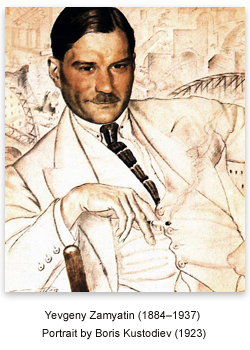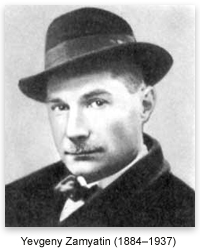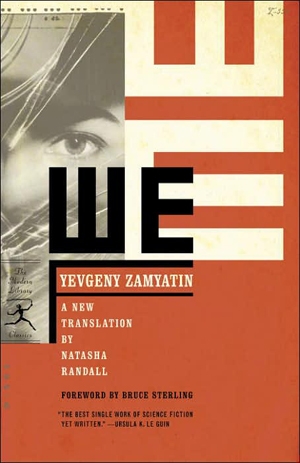In this episode of the Libertarian Tradition podcast series, part of the Mises Institute’s online media library, Jeff Riggenbach makes the case that Yevgeny Zamyatin’s dystopian science fiction novel, We, belongs in the libertarian tradition.
You can also read the transcript below:
When we think of the libertarian tradition, we tend naturally to think of political philosophers and economists of the past. But surely one part of the libertarian tradition belongs to novelists and other fiction writers.
In earlier podcasts in this series, I’ve already discussed two such figures: Ayn Rand, whose 1957 novel, Atlas Shrugged, is, arguably, one of the half-dozen most important libertarian works of the 20th century, and John Ronald Reuel Tolkien, the professor of philology at Oxford whose giant fantasy novel, The Lord of the Rings, published just a few years before Atlas Shrugged, is arguably the most culturally influential single novel published in English in the 20th century.
This week, I’d like to talk about a writer whose level of influence has been much more modest, but whose indirect influence has nevertheless been considerable. Regular listeners to this series know what I mean by indirect influence. I gave an example of it just last week, when I discussed the life and career of Isabel Paterson. Paterson’s libertarian classic, The God of the Machine, has never reached a wide readership, but, thanks to the effort of her protégé, Ayn Rand, Paterson herself has influenced millions of readers who have never even seen a copy of The God of the Machine.
The writer I’m talking about today wrote a novel in which a citizen of a totalitarian state of the future meets a woman and becomes obsessed with her. He begins a forbidden sexual affair with this woman, meeting with her illicitly in a very old part of the city where the intrusive gaze of the all-encompassing government doesn’t seem to penetrate. Through his relationship with her, he becomes involved in the organized underground opposition to the all-encompassing government — an opposition he had never previously realized existed at all. Ultimately, he and the woman are caught, imprisoned, and tortured. In the end, he is sincerely repentant of his crimes and is completely devoted to the all-encompassing government that has done him all this harm.
A familiar story, no? Can you tell me what novel I’ve just described? Ah, I see a hand in the back of the room. Yes? “George Orwell’s 1984,” you cry out confidently. And your answer is correct, but only as far as it goes, which is, perhaps, not quite as far as you thought it would.
That is a description of the plot of 1984, which was published, as we all know, in 1949. But Orwell adapted the plot of 1984 from another novel, one originally published 25 years earlier in 1924. That earlier novel was entitled, simply, We. It was the work of a not-very-well-known Russian writer, Yevgeny Zamyatin. Zamyatin was not very well known outside Russia when We was first published, and he was still not very well known in the West 25 years later, when Orwell published 1984. He remains not very well known in the West to this day.
Nineteen Eighty-Four, by contrast, is extremely well known in the West today, particularly in England and the United States, where words and phrases like “Newspeak,” “doublethink,” “thoughtcrime,” and “Big Brother Is Watching You” are familiar to millions who have never read the novel from which they come.

And there is no getting around the similarities between 1984 and Zamyatin’s We. The leader of the totalitarian state is called “The Benefactor” instead of “Big Brother,” but the basic events of the story are fundamentally the same. And we know that George Orwell did read We several years before he wrote 1984. As Natasha Randall, the translator of the current Modern Library edition of Zamyatin’s novel, told an interviewer for New York City public radio station WNYC in 2006, Orwell made no secret of his admiration for We. Randall explains,
Orwell certainly read it. Actually, he read it I think in the early ’40s, so about 8 years before he wrote his 1984. He had said that it was a great inspiration to him in writing 1984. Orwell also said that he thinks that Huxley was lying when he said he hadn’t read it, because Huxley did maintain that he’d never read We, though of the two — Brave New World and 1984— Brave New World is very similar in lots of ways.
Aldous Huxley’s Brave New World, first published in 1932, is extremely similar to We in a number of ways. Here’s one: the World State in Brave New World is a technocratic one, dedicated to industrial efficiency and mass production. In the words of one critic,
The World State is built upon the principles of Henry Ford’s assembly line — mass production, homogeneity, predictability, and consumption of disposable consumer goods. At the same time as the World State lacks any supernatural-based religions, Ford himself is revered as a deity, and characters celebrate Ford Day and swear oaths by his name (e.g., “By Ford!”). The World State calendar numbers years in the “AF” era — “After Ford” — with year 1 AF being equivalent to 1908 AD, the year in which Ford’s first Model T rolled off of his assembly line.
In Zamyatin’s We, industrial efficiency and mass production are the bywords of life in the technocratic One State. The narrator and main character of Zamyatin’s story, the engineer D-503, tells us that “unquestionably the greatest genius of the ancients” was Frederick Winslow Taylor, the original factory and office “efficiency expert,” who invented time-and-motion studies and took pride in increasing the output of any workplace through what he called “scientific management.” Taylor’s only fault, according to D-503, was that “his thought did not reach far enough to extend his method to all of life, to every step, to the twenty-four hours of every day.”
Another example: in Huxley’s World State, sex is freely available and is, in fact, encouraged. But it is far from the monogamous sex we still regard as the norm in our own society. A popular slogan in the World State is: “everyone belongs to everyone else.” This is repeated incessantly, the formation of families is discouraged, marriage is regarded as antisocial, and, as one perceptive critic of Brave New World describes it, both “sexual competition and emotional, romantic relationships are obsolete.”
In the One State of Zamyatin’s We, first described in print eight years before Brave New World, things are remarkably similar. “Everyone belongs to everyone else.” If you want to have sex with someone, all you have to do is register for that person with the One State, and that person will show up at your room at a prearranged time with a pink ticket for you to tear in half before you get down to business. You’ll have 30 minutes to take care of business, and you’ll find that any kind of privacy is in pretty short supply.
Here is how translator Natasha Randall described the physical appearance of the One State in that 2006 WNYC interview:
The world he creates in We is very clean and very blue. And it’s an urban state, where essentially all of mankind has been driven inside of one great big green wall. And all of nature is banished to the outside of those walls, so you won’t find a flower or an animal within this green wall. And all the buildings in the One State — which is this urban state — are transparent, so one of the nicest lines in the book describes looking up at these transparent buildings where you’ll see people walking on the 20th floor and it looks as though they’re swimming, because there’s no floor beneath them.
As D-503 puts it, “we live in full view, perpetually awash with light, in among our transparent walls, woven from the sparkling air. We have nothing to hide from one another.” Even the citizens of the One State, however, do feel the need for a little privacy on occasion. As Natasha Randall notes, in Zamyatin’s novel,
There are actually times when individuals are allowed to lower blinds in their rooms. And that’s when someone arrives with a pink ticket.
So we know Orwell read and admired We before he wrote 1984, and we don’t know for sure whether Huxley read it before writing Brave New World, but it seems likely.

We also don’t know for sure whether Ayn Rand read Zamyatin’s novel before writing her own story of totalitarianism in the far future, Anthem, which was first published in 1938, fourteen years after the first publication of We. (Rand revised Anthem slightly a few years later for the second edition, which appeared in 1946.) Did she read We before 1938?
In an excellent article, “Zamyatin and Rand,” published in 2003 in the Journal of Ayn Rand Studies and now available online, Peter Saint-Andre argues that Zamyatin’s We was “quite likely” a formative influence on Ayn Rand. He points out that We was completed in 1921, the same year Rand entered the University of Petrograd as a student of history, philosophy, and literature. Rand’s college years, 1921–1924, were, as Saint-Andre notes, “the years of Zamyatin’s greatest fame and influence” in Petrograd. “He was at that time,” Saint-Andre writes,
a hero to writers young and old, admired for his fierce independence and literary individualism, for he was virtually the only literary figure in Russia to voice his resistance to collectivism and conformity. Zamyatin was in those years a highly public literary and philosophical presence in Petersburg, and it is quite possible that Rand read some of his stories and essays … [or] attended one of his many public lectures.
“It also seems probable,” Saint-Andre continues, “that Rand read Zamyatin’s We in the English translation by Gregory Zilboorg published in 1924, for in a 1934 letter to her agent regarding the manuscript for We The Living … she said ‘I have watched very carefully all the literature on [the] new Russia, that has appeared in English.'”
If she did read We during the 1920s or ’30s, Rand probably read it in English. It was not published in Russian during that time, you see. It was not published in Russian, in fact, until 1952. It was not published in the Soviet Union until 1988. After finishing the novel in 1921, Zamyatin found that no publisher was willing to risk publishing it. He circulated it in manuscript around Petrograd, but according to translator Natasha Randall, a teenage university student majoring in history was unlikely to have seen it in that format.
It probably was read by the circle of writers in Saint Petersburg at the time, but it won’t have gotten very much further.
By 1924, the situation had not only not improved — it had actually become worse. The Bolshevik government had banned We. Now it wasn’t just a matter of publishers being too cowardly to bring the book out; now it was a certainty that Zamyatin’s book would not be printed and sold in the Soviet Union. Natasha Randall says there is irony in this, because Zamyatin had run afoul of the Czar’s censors early in his career and had become a Bolshevik himself out of a desire to bring down the Czar’s government.
He was a very ardent revolutionary. In fact, what Zamyatin was was a person who believed in permanent revolution. Once people decide that change no longer needs to occur, that’s where the problem begins. So when the revolution started to stagnate was when Zamyatin became very disenchanted with it, and he wrote these brilliant essays, actually, that are really readable and super entertaining about how one should be a permanent heretic.
Silenced in his native land by the Bolsheviks, desperate for readers, Zamyatin consented to an offer to publish his novel in English translation. It was this English-language edition, brought out in London in 1924, that was the first appearance of We in print. Ayn Rand spent a few days in London en route to America from Petrograd in 1926. She might have picked up a copy of We while she was there. Or she might have read that very same British edition of Zamyatin’s novel in the United States later in the ’20s or in the early ’30s.
“If you want to have sex with someone, all you have to do is register for that person with the One State, and that person will show up at your room at a prearranged time with a pink ticket for you to tear in half before you get down to business.”
For even if Rand hadn’t been in a position to read We in manuscript while a student at Petrograd University, she certainly knew Zamyatin by reputation. As Saint-Andre points out, Zamyatin “was … a highly public literary and philosophical presence” in Petrograd in the early ’20s, when Ayn Rand was a college student already dreaming of escaping from the Soviet Union and moving to America.
But whatever we decide about whether Rand read We in the ’20s or ’30s, there’s simply no getting around the obvious similarities between Zamyatin’s novel and Rand’s Anthem. Both are set in the far future in a completely collectivized totalitarian society. Both are told in the first person by their main characters, in We by the mathematician and engineer D-503, in Anthem by the engineer Equality 7-2521. Anthem is the only work of fiction written by Rand to be written in the first person. In We, D-503 meets a woman, I-330, and is led inexorably down a path to rebellion against the government of the society in which he lives. In Anthem, Equality 7-2521 meets a woman, Liberty 5-3000, and is led inexorably down a path to rebellion against the government of the society in which he lives.
In the society in which Equality 7-2521 lives, the first-person singular pronoun — I — has ceased to exist. In D-503’s society, in We, the pronoun is still in use. But the mindset of the two far future societies is very much cut from the same cloth. “Each morning,” Zamyatin’s D-503 writes,
with six-wheeled precision, at the exact same hour, at the exact same minute, we, the millions, rise as one. At the exact same hour, we uni-millionly start work and uni-millionly stop work. And, merged into a single, million-handed body, at the exact same Table-appointed second, we bring spoons to our lips, we go out for our walk and go to the auditorium, to the Taylor Exercise Hall, go off to sleep…. The small, bright, crystal bell in the bed’s headboard rings: 07:00. It’s time to get up. On the right, on the left, through the glass walls, it’s as if I am seeing myself, my room, my nightshirt, my motions, repeating themselves a thousand times. This cheers me up: one sees oneself as part of an enormous, powerful unit.… We walk — one million-headed body — with a humble joy in each of us, similar, I imagine, to what molecules, atoms, and phagocytes experience. The Christians of the ancient world (our only predecessors, as imperfect as they were) also understood this: humility is a virtue and pride is a vice; ‘WE’ is divine, and ‘I’ is satanic.
Yevgeny Zamyatin was born in rural Russia on February 20, 1884. He died just a little more than 53 years later, in exile, in Paris, on March 10, 1937. His only novel was not widely read during his brief life, nor is it widely read today. It’s become one of those classics people would rather acknowledge as classics than actually sit down to read. But it has exercised an immense influence, especially in the English-speaking world, thanks to writers like George Orwell, who did read it, and writers like Aldous Huxley and Ayn Rand, who probably read it. By influencing their more famous dystopian novels — 1984, Brave New World, and Anthem — We has made itself an honored place in the libertarian tradition.
[This article was first published online as a Mises Daily article and is transcribed from the Libertarian Tradition podcast episode “Yevgeny Zamyatin: Libertarian Novelist.”]















